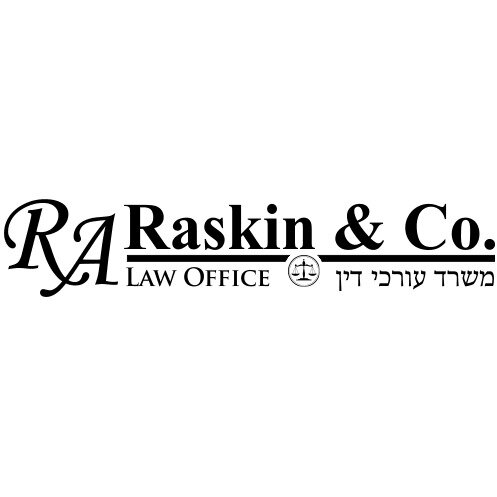Best Education Law Lawyers in Haifa
Share your needs with us, get contacted by law firms.
Free. Takes 2 min.
List of the best lawyers in Haifa, Israel
About Education Law in Haifa, Israel
Education Law in Haifa, Israel, is an expansive field designed to regulate educational institutes, the rights and obligations of students and educators, and the responsibilities of educational authorities. This legal framework encompasses a variety of issues including access to education, student discipline, special education needs, discrimination, and more. Israel’s education system is primarily governed by the Ministry of Education, with additional guidelines and adaptation at the municipal level, particularly in cities like Haifa. Compliance with national laws and regulations is essential for ensuring the provision of education is equitable and accessible to all students.
Why You May Need a Lawyer
There are several situations where individuals or families might seek legal assistance in the realm of Education Law:
- Disputes regarding admission, expulsion, or suspension of a student.
- Concerns over discrimination based on religion, ethnicity, or disabilities.
- Addressing the needs of children requiring special education services.
- Compliance issues faced by educational institutions with national and local regulations.
- Disagreements related to teacher rights and employment issues.
- Understanding and enforcement of students' rights under existing laws.
- Conflicts over curriculum content and parental rights to influence educational materials.
Local Laws Overview
Education Law in Haifa aligns with national Israeli education regulations, but there are specific local considerations:
- Municipal regulations that implement Ministry of Education directives.
- Rules concerning the allocation and management of resources for schools.
- Provisions for diverse populations, including support for Arabic-speaking and immigrant students.
- Guidelines to handle disciplinary issues within schools.
- Special arrangements for students with disabilities to ensure inclusive education.
Frequently Asked Questions
1. What rights do students have under Israeli Education Law?
Students have the right to free and compulsory education, protection from discrimination, and accommodations for disabilities. They also have the right to express their opinions and participate in school activities without fear of unfair treatment.
2. How can I address discrimination in a school setting?
Incidents of discrimination can be reported to school authorities, and if unresolved, a lawyer can help file a complaint with the Ministry of Education or take legal action to ensure compliance with anti-discrimination laws.
3. What is the process for securing special education services?
Parents should collaborate with school officials to assess the child's needs, which may involve an evaluation by educational psychologists. A legal advocate can assist if there are difficulties obtaining services or accommodations.
4. Are there laws affecting the curriculum taught in schools?
Yes, national guidelines dictate the core curriculum, but there may be local adaptations. Parents can discuss concerns through Parent-Teacher Associations (PTAs) or seek legal guidance if curriculum content violates educational standards.
5. How can schools handle disciplinary actions legally?
Schools must follow clear regulations and due process before implementing expulsion or suspension. Legal advice can ensure these actions comply with students' rights and fair treatment standards.
6. What are the legal requirements for homeschooling in Haifa?
Homeschooling is permitted but requires registration with local education authorities and adherence to national curriculum standards.
7. How are disputes between teachers and schools resolved?
Disputes can be addressed through internal school processes, but legal representation may be required for issues related to employment contracts or violations of labor laws.
8. Can parents choose which school their child attends?
While there is some choice, it may be limited by geographic location and capacity restrictions. Local education authorities can provide guidance on available options.
9. What recourse do I have if my child is unjustly suspended?
A parent can appeal the suspension with the school, and if necessary, seek legal intervention to review whether disciplinary procedures were fairly applied.
10. How does the appeal process work for special education decisions?
Families can appeal through school committees or submit a formal request for reconsideration by the Ministry of Education, often with the support of a legal advocate.
Additional Resources
Consider reaching out to the following resources for further assistance:
- Ministry of Education - handles national education policies and regulations.
- Haifa Municipal Education Department - provides local support and regulation.
- Legal clinics at local universities - often provide free or low-cost legal assistance.
- Parent Teacher Associations (PTAs) - serve as a forum for discussing school-related issues.
- Nonprofit organizations advocating for educational rights and special needs support.
Next Steps
If you need legal assistance in Education Law, consider these steps:
- Identify the specific issue you are facing and gather relevant documentation.
- Consult with a lawyer specializing in education law to discuss your circumstances and legal options.
- Contact local or national bodies that oversee education for guidance and support.
- Attend information sessions or workshops offered by advocacy groups to learn more about your rights.
- Consider mediation or alternative dispute resolution if appropriate, as a means to resolve conflicts without litigation.
Lawzana helps you find the best lawyers and law firms in Haifa through a curated and pre-screened list of qualified legal professionals. Our platform offers rankings and detailed profiles of attorneys and law firms, allowing you to compare based on practice areas, including Education Law, experience, and client feedback.
Each profile includes a description of the firm's areas of practice, client reviews, team members and partners, year of establishment, spoken languages, office locations, contact information, social media presence, and any published articles or resources. Most firms on our platform speak English and are experienced in both local and international legal matters.
Get a quote from top-rated law firms in Haifa, Israel — quickly, securely, and without unnecessary hassle.
Disclaimer:
The information provided on this page is for general informational purposes only and does not constitute legal advice. While we strive to ensure the accuracy and relevance of the content, legal information may change over time, and interpretations of the law can vary. You should always consult with a qualified legal professional for advice specific to your situation.
We disclaim all liability for actions taken or not taken based on the content of this page. If you believe any information is incorrect or outdated, please contact us, and we will review and update it where appropriate.










